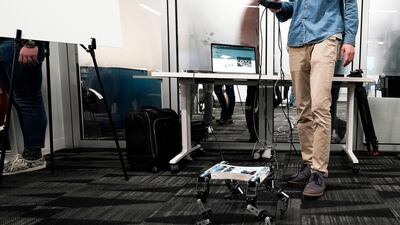Three-quarters of employees in the two biggest Arab economies - Saudi Arabia and the UAE - believe robots can replace them at work in the next ten years, reflecting a growing awareness about how significantly technology can impact the job market in the region, according to a new survey.
Workers are preparing for the rapidly changing labour market, however, a fear of automation - the technology that enables robots to perform repetitive tasks - remains a major concern for those getting the fewest opportunities to learn new skills, global consultancy PwC found.
With the regional governments' push to invest more on artificial intelligence, digitalisation and automation, employment opportunities are being transformed, favouring a more tech-savvy labour force. By 2022, 42 per cent of core skills required to perform existing jobs are expected to change, according to the World Economic Forum.
In addition to high-tech skills, specialised interpersonal skills - so-called "soft skills" - will be in greatest demand, in sectors including sales, human resources, healthcare and education.
“Our jobs are changing, and fast. Many roles are disappearing altogether, with new, more meaningful roles taking their place," Hani Ashkar, a senior Middle East partner at PwC, said.
For its part, PwC is investing $3 billion (Dh11bn) back into the company to up-skill its employees over the next four years.
The company's findings are based on a survey taken in October and November 2019 of a sample of 2,016 adults in the UAE and Saudi Arabia, of whom 89 per cent were employed. The regional research is part of a larger global study that polled more than 22,000 adults across 11 other countries.
Opportunities and attitudes "varied significantly" based on an individual’s level of education, location, gender and age, according to PwC.
Women in the GCC expressed far greater anxiety than men about technology upending the job market with 63 per cent of women said they are worried that new technology will make their job redundant versus 35 per cent of men.
Men were also more likely than women to think that technology will have a positive impact on their jobs and improve their employment prospects. They are also more likely to be learning new skills with 74 per cent of men reported doing so versus 66 per cent of women.
However, the region is falling behind in terms of learning opportunities: 23 per cent of those polled are learning new skills through their employer to better understand or use technology, compared to 33 per cent globally.
But nearly everyone surveyed in the GCC - 96 per cent - indicated a willingness to learn new skills now to improve their future employability.
"Upskilling is more than just training," said Mr Ashkar. "It’s about being equipped to participate and adapt in an increasingly digital world.”
THURSDAY'S ORDER OF PLAY
Centre Court
Starting at 10am:
Lucrezia Stefanini v Elena Rybakina (6)
Aryna Sabalenka (4) v Polona Hercog
Sofia Kenin (1) v Zhaoxuan Yan
Kristina Mladenovic v Garbine Muguruza (5)
Sorana Cirstea v Karolina Pliskova (3)
Jessica Pegula v Elina Svitolina (2)
Court 1
Starting at 10am:
Sara Sorribes Tormo v Nadia Podoroska
Marketa Vondrousova v Su-Wei Hsieh
Elise Mertens (7) v Alize Cornet
Tamara Zidansek v Jennifer Brady (11)
Heather Watson v Jodie Burrage
Vera Zvonareva v Amandine Hesse
Court 2
Starting at 10am:
Arantxa Rus v Xiyu Wang
Maria Kostyuk v Lucie Hradecka
Karolina Muchova v Danka Kovinic
Cori Gauff v Ulrikke Eikeri
Mona Barthel v Anastasia Gasanova
Court 3
Starting at 10am:
Kateryna Bondarenko v Yafan Wang
Aliaksandra Sasnovich v Anna Bondar
Bianca Turati v Yaroslava Shvedova
Killing of Qassem Suleimani
SPECS
%3Cp%3E%3Cstrong%3EEngine%3A%20%3C%2Fstrong%3E4-litre%20flat-six%0D%3Cbr%3E%3Cstrong%3EPower%3A%20%3C%2Fstrong%3E525hp%20(GT3)%2C%20500hp%20(GT4)%0D%3Cbr%3E%3Cstrong%3ETorque%3A%20%3C%2Fstrong%3E465Nm%20(GT3)%2C%20450Nm%20(GT4)%0D%3Cbr%3E%3Cstrong%3ETransmission%3A%20%3C%2Fstrong%3ESeven-speed%20automatic%0D%3Cbr%3E%3Cstrong%3EPrice%3A%20%3C%2Fstrong%3EFrom%20Dh944%2C000%20(GT3)%2C%20Dh581%2C700%20(GT4)%0D%3Cbr%3E%3Cstrong%3EOn%20sale%3A%20%3C%2Fstrong%3ENow%0D%3Cbr%3E%3C%2Fp%3E%0A
Specs
Engine: Duel electric motors
Power: 659hp
Torque: 1075Nm
On sale: Available for pre-order now
Price: On request
'My Son'
Director: Christian Carion
Starring: James McAvoy, Claire Foy, Tom Cullen, Gary Lewis
Rating: 2/5
Bridgerton%20season%20three%20-%20part%20one
%3Cp%3E%3Cstrong%3EDirectors%3A%20%3C%2Fstrong%3EVarious%3C%2Fp%3E%0A%3Cp%3E%3Cstrong%3EStarring%3A%3C%2Fstrong%3E%20Nicola%20Coughlan%2C%20Luke%20Newton%2C%20Jonathan%20Bailey%3C%2Fp%3E%0A%3Cp%3E%3Cstrong%3ERating%3A%20%3C%2Fstrong%3E3%2F5%3C%2Fp%3E%0A
Test
Director: S Sashikanth
Cast: Nayanthara, Siddharth, Meera Jasmine, R Madhavan
Star rating: 2/5
The biog
Family: He is the youngest of five brothers, of whom two are dentists.
Celebrities he worked on: Fabio Canavaro, Lojain Omran, RedOne, Saber Al Rabai.
Where he works: Liberty Dental Clinic
Children who witnessed blood bath want to help others
Aged just 11, Khulood Al Najjar’s daughter, Nora, bravely attempted to fight off Philip Spence. Her finger was injured when she put her hand in between the claw hammer and her mother’s head.
As a vital witness, she was forced to relive the ordeal by police who needed to identify the attacker and ensure he was found guilty.
Now aged 16, Nora has decided she wants to dedicate her career to helping other victims of crime.
“It was very horrible for her. She saw her mum, dying, just next to her eyes. But now she just wants to go forward,” said Khulood, speaking about how her eldest daughter was dealing with the trauma of the incident five years ago. “She is saying, 'mama, I want to be a lawyer, I want to help people achieve justice'.”
Khulood’s youngest daughter, Fatima, was seven at the time of the attack and attempted to help paramedics responding to the incident.
“Now she wants to be a maxillofacial doctor,” Khulood said. “She said to me ‘it is because a maxillofacial doctor returned your face, mama’. Now she wants to help people see themselves in the mirror again.”
Khulood’s son, Saeed, was nine in 2014 and slept through the attack. While he did not witness the trauma, this made it more difficult for him to understand what had happened. He has ambitions to become an engineer.


